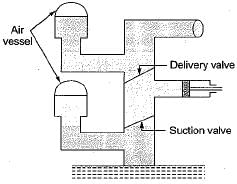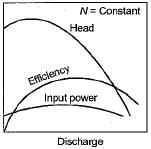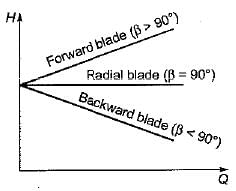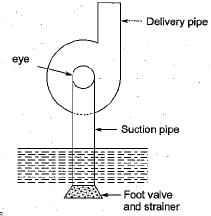Test: Hydraulic Pump - 3 - Mechanical Engineering MCQ
15 Questions MCQ Test - Test: Hydraulic Pump - 3
A centrifugal pump gives maximum efficiency when its blades are
Discharge of a double acting reciprocating pump is
where
L = length of stroke
A = cross-section area of piston
N = speed of crank in RPM
where
L = length of stroke
A = cross-section area of piston
N = speed of crank in RPM
The flow of water leaving the impeller in a centrifugal pump casing is
The characteristics of a pump are as shown in the given figure. Based on this figure, match List-I with List-II choose the correct answer using the codes given below the list:

List - I
A. Curve P
B. Curve Q
C. Curve R
List - II
1. Discharge versus head
2. Head versus discharge
3. Power versus discharge
4. Efficiency versus discharge
Codes
A B C
(a) 2 4 3
(b) 1 3 2
(c) 1 4 3
(d) 4 3 1
A pump running at 1000 rpm consumes 1 kW and generates head of 10 m of water. When it is operated at 2000 rpm. Its power consumption and head generated would be
Match List-I (Type of pump) with List-ll (Liquid handled) and select the correct answer using the codes given below:
List-I
A. Closed impeller pump
B. Semi-open impeller pump
C. Open impeller
List-ll
1. Sandy water
2. Acids
3. Sewage water
Codes:
A B C
(a) 1 3 3
(b) 3 1 2
(c) 2 3 1
(d) 1 2 3
Consider the following statements regarding air vessels provided in reciprocating pump installations
1. The air vessels are fitted both on suction and delivery sides
2. The air vessels are fitted for from the pump cylinder
3. The air vessels save energy by reducing the friction loss
Q. Which of these statements are correct?
Select the most appropriate pump from Group-2 to handle each fluid flow given in Group-1.
Group - 1
P. Highly viscous fluid flow
Q. Fluid containing large amount of abrasive solid
Group - 2
1. Piston pump
2. Gear pump
3. Plunger pump
4. Centrifugal pump
When two identical centrifugal pumps are operating in series on a common rising main then
Match List-I (out-let vane angle β2) with List-II (curves labelled 1, 2 and 3 in the given figure) for a pump and select the correct answer using the codes given below the lists:
List-I
A. β2 < 90°
B. β2 = 90°
C. β2 > 90°
List-II
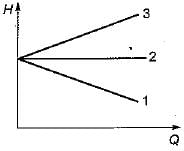
Codes:
A B C
(a) 1 2 3
(b) 1 3 2
(c) 2 1 3
(d) 3 2 1
The correct sequence of the centrifugal pump components through which the fluid flows is
At the eye tip of a centrifugal impeller, blade velocity is 200 m/s. While the uniform velocity at the inlet is 150 m/s. If the sonic velocity is 300 m/s then the inlet mach number of the flow will be





